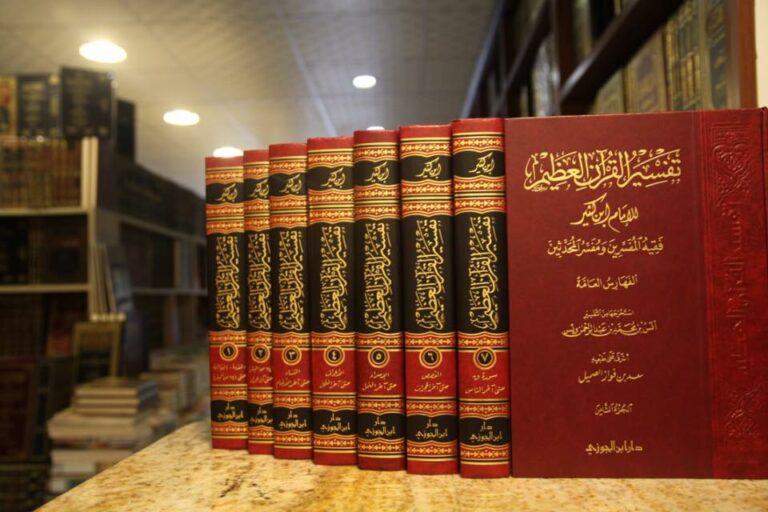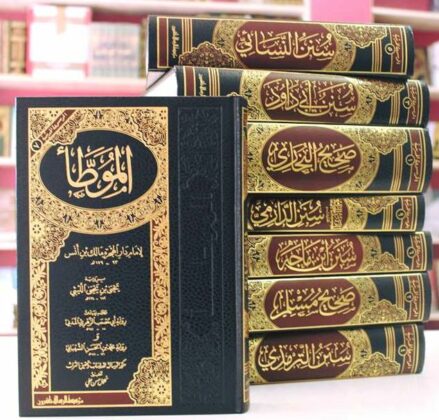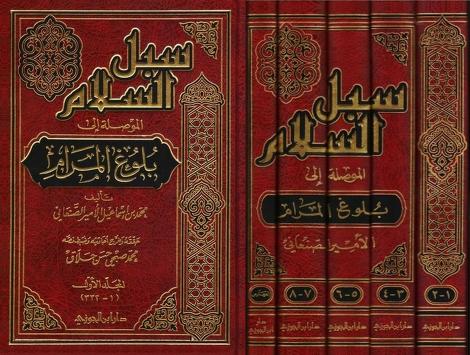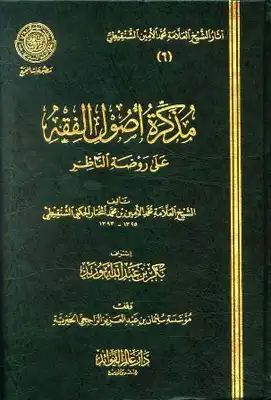“Zul, did you get what Syeikh Muhammad bin Muhammad al-Mukhtar’s explanation just now?” Azhan asked right after class. Syeikh’s class is among the most awaited classes for his solid arguments and comprehensive knowledge.
“What’s the issue? The one on Fath al-zara’i? Oh…it’s actually easy to understand. The terminology is mentioned by Imam AL-Qarafi. He’s a great scholar of madhhab Maliki.”
اعْلَمْ أَنَّ الذَّرِيعَةَ كَمَا يَجِبُ سَدُّهَا يَجِبُ فَتْحُهَا وَتُكْرَهُ وَتُنْدَبُ وَتُبَاحُ
“Know that indeed, zari’ah (doors that lead to anything that is prohibited) is obligatory (wajib) to be closed, the same as it is obligatory, makruh, sunnah and permissible to be opened (in certain situations).
Sometimes, the wasilah (route) towards a haram (prohibited), is not prohibited if it would result in a clear or greater good. [1] Some scholars named it fath abwab al-khair (opening the doors to goodness). For example, the permissibility of the authorities to set a ceiling price for certain goods. Although the policy will result in a loss for the seller, however, there is a clear or greater good, which is to protect consumers who are the majority of a community from having to pay exorbitant prices for products due to monopoly, price speculation and fraud by sellers.”
Zul pauses before continuing, “Imam Abu Hanifah once issue a fatwa which gives temporary permission for Persian who has just embrace Islam to recite their prayer recitation in Persian when he prays for it is exceptionally difficult for Persians to enunciate the Arabic words. However, according to later Hanafiyyah scholars, Imam Abu Hanifah has retracted the fatwa and hold the final opinion that it cannot be recited except in Arabic. The main point is, I just wanted to mention that this matter may and has happened previously. [2]
Whilst Imam Ibn Qayyim has also discussed the types of wasilah and zari’ah. There are wasilah which are originally permissible although there is a possibility of harm (mafsadah), however, the maslahah is clearer and greater compared to the harm. For example, the permissibility of looking at the face of the woman one intends to marry, being truthful in front of a cruel ruler and others. In these circumstances, Shariah ruled it permissible, encouraged or obligates such wasilah depending on the evaluation of the level of the maslahah. [3]
So, do you get it now?” Zul asked Ahan. “Ooo… yes, I totally get it now. Thanks, Zul!” Azhan smiled at his friend sheepishly before proceeding to the canteen.
Zul glances at his wristwatch that he always wears on his right hand. In about 15 minutes his class will start. The lecture session at the Islamic University of Medina commences from 7 in the morning till 1 in the evening. The duration for each class is 1 hour and there will be a thirty minutes break before the lectures end at 1. An admirable custom in Kulliyyah Shariah as well as the university as a whole, rarely will any of the lecturers arrives late or miss a session. Even if it happens, it will only be once or twice in an entire semester. The hopes of some students to go back and sleep at their hostel if there is any class cancelled is usually all but shattered! The lecturers always emphasize and remind their students of manners and character in studying. Indirectly, it helps in moulding and shaping high-quality graduates.
While waiting for Syeikh Dr Muhammad bin Muhammad al-Mukhtar al-Syinqiti to arrive, Zul flipped through the pages of Bidayah al-Mujtahid which is the main syllabus for the Fiqh subject. Bidayah al-Mujtahid wa Nihayah al-Muqtasid is a book that discusses the fiqh of madhhab comparison written by Ibn Rusyd. Ibn Rusyd is a renowned Fiqh Scholar in madhhab Maliki who was born in the city of Cordoba, Andalusia in the year 502H/1126M and passed away in the city of Marakesh in the year 595H/1198M. From the title of this book, it is understood that Ibn Rusyd wrote this book as early preparation for a person who will be conducting his ijtihad as well as to act as the main reference for other mujtahids whose level of understanding in fiqh is moderate. This book is divided into 5 main parts which are Ibadah/Worship (77 issues), Family (20 issues), Muamalat/Finance (36 issues), Crime (6 issues) and Legislation (4 issues).
Students are introduced with tarjih (drawing the most compelling conclusion) methodology whether through sanad, matan (text) or by referring to external matters, for instance, tarjih through sanad; it is when there are two hadiths, the first hadith has more narrators in its sanad compared to the second hadith. Then the hadith with more narrators is the tarjih. The reason is it is a stronger assumption we can make and the possibility of a mistake being made by a lot of people of a certain matter is smaller compared to the same mistake is made by a smaller number of people.
In al-Ihkam fi Usul al-Ahkam, Imam Saifuddin al-Amidi has stated 51 forms of tarjih referring to the matan. Among them is the methodology of prohibition is prioritized over a commandment. This is also based on the methodology which rejects mafsadah is prioritized over something that could be of benefit. Likewise for phrases with clear literal meaning is prioritized over phrases with implied meaning, for clear phrases do not need proof (qarinah). Whereas, for tarjih by refering to external matters, it means if there are two dalils, then we should prioritize the dalil which is nearer to ihtiyat (careful), thus, freeing ourselves from burdens (bara’ah al-zimmah). The reason is this is nearer towards maslahah and rejecting harm.

Syeikh Muhammad bin Muhammad al-Mukhtar al-Syinqiti
That day, Syeikh Dr Muhammad bin Muhammad al-Mukhtar al-Syinqiti deliberates on the ruling of a person who has performed ablution and then touches (has physical contact) his wife. “Allah SWT states:
أَوۡ لَٰمَسۡتُمُ ٱلنِّسَآءَ
“…or you have contacted women,” [4]
Zul listened attentively to Syeikh’s every word of explanation and notes it down.
Syeikh continues his explanation. “According to this verse, the fuqaha’ have two famous opinions regarding the issue of having physical contact with a woman. Does it invalidate one’s ablution or not? Some of them said that the verse refers to have jimak or intercourse with a woman. While other scholars said that the verse mentions that any physical contact will invalidate ablution.
To put it simply, among the arguments presented by those who said that it invalidates ablution is an Islamic legal maxim that states:
الأَصْلُ فِي الكَلَامِ الحَقِيْقَة
“The origin of a speech is through its literal meaning.”
Hence, the scholars state that the word al-lams (contact) is understood in its literal meaning as any type of physical contact. Whereas, for scholars who state that it does not invalidate ablution they based their opinion on an Islamic legal maxim which states:
إِذَا تَعَذَّرَ إِعْمَالُ الكَلَامِ عَلَى الحَقِيقَةِ يُصَارُ إِلَى المَجَازِ
“If there’s a debility to implement a speech from its literal meaning, we can turn to its implied meaning.”
Thus, some scholars said there’s a debility to implement the word al-lams from its literal meaning. They then turn to its majazi (implied) meaning for the word al-lams which is jimak or intercourse.
The debility in implementing the literal meaning of the word al-lams is due to the fact that there are prophetic evidences that narrates that Rasullullah PBUH kisses a part of his wife’s body before he went to perform his prayer without retaking his ablution.
Is there anyone here from Malaysia? Zulkifli? You’re a Malaysian?” The Syeikh turns his attention and looks straight at Zul. “Yes, that’s true Syiekh. I’m Malaysian.” Zul answered calmly smiling as he looks back at his teacher. “Good. Can you explain to us, what’s the opinion of the madhhab in Malaysia on this matter? In my knowledge, Malaysia holds the madhhab Syafie.”
“Ok, Syeikh,” Zul answered simply, He promptly stands up and start his explanation. Coincidentally, just last night, he did a revision of the book al-Iqna’ that he studied in SMAASZA.
“In al-Iqna’, Imam al-Bujairimi stated:
من نواقض الْوضُوء (لمس الرجل) ببشرته (الْمَرْأَة الْأَجْنَبِيَّة) أَي بَشرَتهَا من غير حَائِل
“Among the matters which invalidate ablution is physical contact between a non-mahram grown man and woman (skin contact).”
Syafi’iyyah scholars understood the contact in its literal meaning of any skin contact and not the implied meaning as understood in other madhhabs. Imam al-Nawawi states:
أَنَّ الْتِقَاءَ بَشَرَتَيْ الْأَجْنَبِيِّ وَالْأَجْنَبِيَّةِ ينتقض سواء كان بشهوة وبقصد أم لا ولا ينتقص مَعَ وُجُودِ حَائِلٍ وَإِنْ كَانَ رَقِيقًا
“Indeed, skin contact of an ajnabi man and woman invalidates ablution regardless whether it is with desires or not. And the ablution is not invalidated if no direct skin contact, even if it is with an article of thin clothing.” [5]
The Syeikh’s smiled and thanked Zul for his explanation. “Great explanation Zulkifli. You should all follow Zulkifli’s lead. It shows that you already have a good basic understanding of your madhhab.” Syeikh praises Zul.
************
The subject Usul al-Fiqh is taught by Syeikh Dr Soleh al-Ghannam. Through his Usul Fiqh class, Zul is introduced to the book Raudhah al-Nazir by Ibn Qudamah al-Maqdisi. Syeikh Muhammad al-Amin al-Syinqiti, the author of the famous commentary book, Adwa’ al-Bayan has simplified his book so that it will be easier for students to understand it and named it Muzakkirah Usul al-Fiqh ‘ala Raudhah al-Nazir.
In the beginning, it’s quite hard for Zul to follow what is being taught. He tried to give his entire attention to the lesson during the lecture but failed to completely comprehend the subject. “O Allah… this is so hard! Why can’t I get it…?” Zul complained alone. He nearly gave up in regret. One night, he read several books on Usul al-Fiqh countless times, but still couldn’t understand the subject. With a sigh, he closed the book Muzakkirah Usul al-Fiqh ‘ala Raudhah al-Nazir pushing it away. He stood up and went to his bookshelf looking for other books for some light reading. His fingers brush through the titles of books and stopped at Diwan al-Syafi’e, he picked it and sat down to read. As he was skimming through the pages, a stanza of a poem by Imam al-Syafie caught his eyes.
بقَدْرِ الكدِّ تُكتَسَبُ المَعَــالي *ومَنْ طَلبَ العُلا سَهِـرَ اللّيالي
The peak is conquered through hard work* Whoever dreams of reaching the peak has to burn the midnight oil.
ومَنْ رامَ العُلى مِن ْغَيرِ كَـدٍّ * أضَاعَ العُمرَ في طَـلَبِ المُحَالِ
Whoever aspires to high status and honour without work or struggle* Hence, they are just wasting their time and life wishing for the impossible.
تَرُومُ العِــزَّ ثم تَنامُ لَيـلاً * يَغُوصُ البَحْرَ مَن طَلَبَ اللآلي
You expect success and yet just sleeps through the night* People searching for pearls have to dive in the ocean to get it.
The poem by Imam al-Syafie hits a nerve in Zul. His drooping eyes were refreshed. He was moved and motivated. “To be well-versed in something, I can’t possibly just sleep!” Zul copied the poem on a piece of paper and pasted it on his study table. Those were the motivational words throughout his stay in Medina. From then on, Zul studied hard and become somewhat of an expert on the subject Usul Fiqh and was then referred by his friends so they can learn and understand the subject better from him.
**************

During recess, Zul will usually revise on the subject of Tafsir (commentary). The main reference book for Tafsir is Tafsir al-Qur’an al-Azim by Ibn Kathir. Although there are some lecturers who didn’t use this Tafsir as the sole reference but also other references. Khairul is sitting in front of him reading Mabahith fi Ulum al-Qur’an.
Tafsir Ibn Kathir is among the famous tafsir bi al-ma’thur. Ibn Kathir who holds unto madhhab Syafie begins the tafsir of each by stating its advantages and the reason for its revelation. Afterwards, he explained the number of the verses and sometimes the number of letters, surah and other matters that is related to the surah he is commenting on proving the miracles of the Quran. He divided the verses that he is commenting on based on the content and narration presented by the verses accordingly. Thus, the total number of verses commented in each group is different.
Ibn Kathir gave great emphasis and focus on the stories of the Prophets and Messengers as well as other related stories in the Quran. When presenting these stories, Ibnu Kathir will often remind his readers that Israiliyyat influence and stories have started to work themselves into Quran Tafsir books and there should be an imperative effort in protecting and cleansing them from such elements.
“Ayub, did you know? Tafsir Ibn Kathir is unlike any other and special because he states the status of each hadith he presented in his book. You’ll find the hadiths where he takhrij each of their status as sahih, hasan, da’if, Gharib, munkar. This is proof that he’s not just anybody but an ace in the field of hadith. Look here…” Zul tapped Khairul’s shoulder beckoning him to look at the tafsir presented by Ibn Kathir regarding the Isra’ and Mi’raj incident. Hadiths which mention and narrates the incident of Isra’ and Mi’raj is discussed in-depth and comprehensively by Ibn Kathir.
In terms of fiqh, Ibn Kathir discusses the fuqaha’ opinions, especially when commenting on the verses regarding rulings. For example, when discussing the punishment for a renegade and thief, the time for the slaughter of qorban in Mina and the ruling of washing both feet while performing ablution. He also criticizes bid’ah school of thoughts such as Syi’ah in several issues such as mut’ah marriage, wiping both feet while taking ablution and others.
**************

For the subject Hadith, Zul starts his lesson with Sahih al-Bukhari and its discussion and commentary Fath al-Bari which focuses on several chosen chapters. His previous talaqqi lesson in Nabawi Mosque with Syeikh Muhammad ‘Ali Thani greatly helps him in understanding the discussion and explanation of his lecturer in class. In his second year, a new syllabus is introduced which is Sahih Muslim and students are free to choose from any of the kutub al-sittah (Sahih Al-Bukhari, Sahih Muslim, Sunan Abu Daud, Sunan al-Nasa’ie, Sunan al-Tirmizi and Sunan Ibnu Majah) and they will continue their lesson until their fourth year.
If one just considers the title of Sahih al-Bukhari, it clearly shows the manhaj of Imam al-Bukhari in publishing his masterpiece. Al-Jami’s means a collection, al-Sahih means sahih hadiths, al-Musnad means hadiths which have a continuous sanad to Rasullullah PBUH and al-Mukhtasar is a compendium of the hadith’s text. Manhaj fiqh Imam al-Bukhari can be understood through the chapters arranged by him. For the purpose of creating this book, Imam al-Bukhari has included 7,563 hadiths [6], from more than 100 thousand sahih hadiths in his book. This is concluded from the statement made by Imam al-Bukhari himself, where he said:
أَحْفَظُ مِائَةَ أَلْف حَدِيْث صَحِيْح وَأَعْرِفُ مِائَتَيْ أَلْف حَدِيْث غَيْر صَحِيْح
“I’ve memorized 100 thousand sahih hadiths and know 200 thousand hadiths which are not sahih.”
“Zul, what book are you searching for…?” Shohor Bani asked Zul when he came across Zul at the bookstore. They rarely ever see each other on campus since they both studied in different kulliyyahs, where Zul is in Shariah while Shohor Bani is in Dakwah and Usuluddin. “I’m looking for Subul al-Salam, syarah Bulugh al-Maram. Imam al-San’ani wrote the syarah for Imam Ibn Hajar al-Asqalani. My Fiqh Hadith subject this semester.” Zul answered as his eyes scanned the bookshelves. “Eh… didn’t we get free books?” Zul reaches for the book he was searching for from the topmost shelf and said, “Yeah, just that I’m planning to post this to Malaysia. My brother requested a copy.”

Such are the advantages of studying at the Islamic University of Medina. The books included in their syllabus are given free for all students. Hence, it’s such a loss if there are those who refuse to grab the opportunity and gave 1001 excuses for not succeeding.
***************

Our teacher, Syeikh ‘Abdullah bin Muhammad al-Ghunaiman
al-‘Aqidah al-Tahawiyyah is the main book in the syllabus of the subject Akidah in Shariah Kulliyyah. This subject is taught by Syeikh ‘Abdullah bin Muhammad al-Ghunaiman, a respected scholar in Medina who is also the Head of the Higher Education Committee, Islamic University of Madinah. This book which is written by Imam Abu Ja’far al-Tahawi is an accumulation of 105 simple arranged expositions of akidah Sunnah wal Jama’ah. Syarah by Ibn Abi al-‘Izz al-hanafi is among the most popular syarah for al-Ta’liqat al-Saniyyah ‘ala Matn al-Aqidah al-Tahawiyyah which is a simpler book written by Syeikh Ahmad Jabir Jubran al-Makki al-Yamani. This book is also known as Bayan I’tiqad Ahl al-Sunnah wa al-Jama’ah.
“Zaini, in my personal opinion, the book al-‘Aqidah al-Tahawiyyah is among the most amazing books even when it is just a thin book.” Zul showed his book to Zaini, as they were enjoying the hummus and Pepsi for their dinner after Isya’ in their campus’ dormitory. “Why is it so amazing? What separates it from other books?” Zaini asked baffled. “First, Imam Tahawi himself wrote in this book that that is book is arranged following the methodology of Imam Abu Hanifah, Imam Abu Yusuf, and Imam Muhammad bin Hasan al-Syaibani. This means it follows the guidelines of the salafussoleh. Second, the fours madhhab scholars have also acknowledged the akidah of Imam al-Tahawi is accepted by salaf and khalaf scholars. Syeikh ‘Abdul Qadir al-Mandili has also translated it into JAWI and wrote the summary of Syarah Ibn Abi al-‘Izz al-Hanafi for this book. Its title is Perisai Bagi Sekalian Mukallaf (A Shield for Mukallaf).”
“Come on, let’s go to sleep. Tomorrow we are going to visit some scholars…” Zul closes his book, rearranges his Nahu and Saraf books that he had used for his classes and lie down on his bed. He couldn’t wait for tomorrow, for tomorrow some of the scholars he has always admired is going to visit Medina.
________________________
[1] Anwār al-Burūq fi Anwāʿ Al-Furūq, 3/46 – 47 [2] Tabyin al-Haqa’iq Syarh Kanz al-Daqa’iq 1/110 dan al-Binayah Syarh al-Hidayah 2/179 [3] I’lam al-Muwaqqi’in, 3/109-110 [4] Surah al-Nisa’ (43) [5] Al-Majmūʿ Sharḥ al-Muhadhdhab, 2/30 [6] Refer to Hindiyyah publication that we used for Sahih Bukhari Translation that we published in collaboration with Madrasah Miftahul Ulum Sri Petaling.
